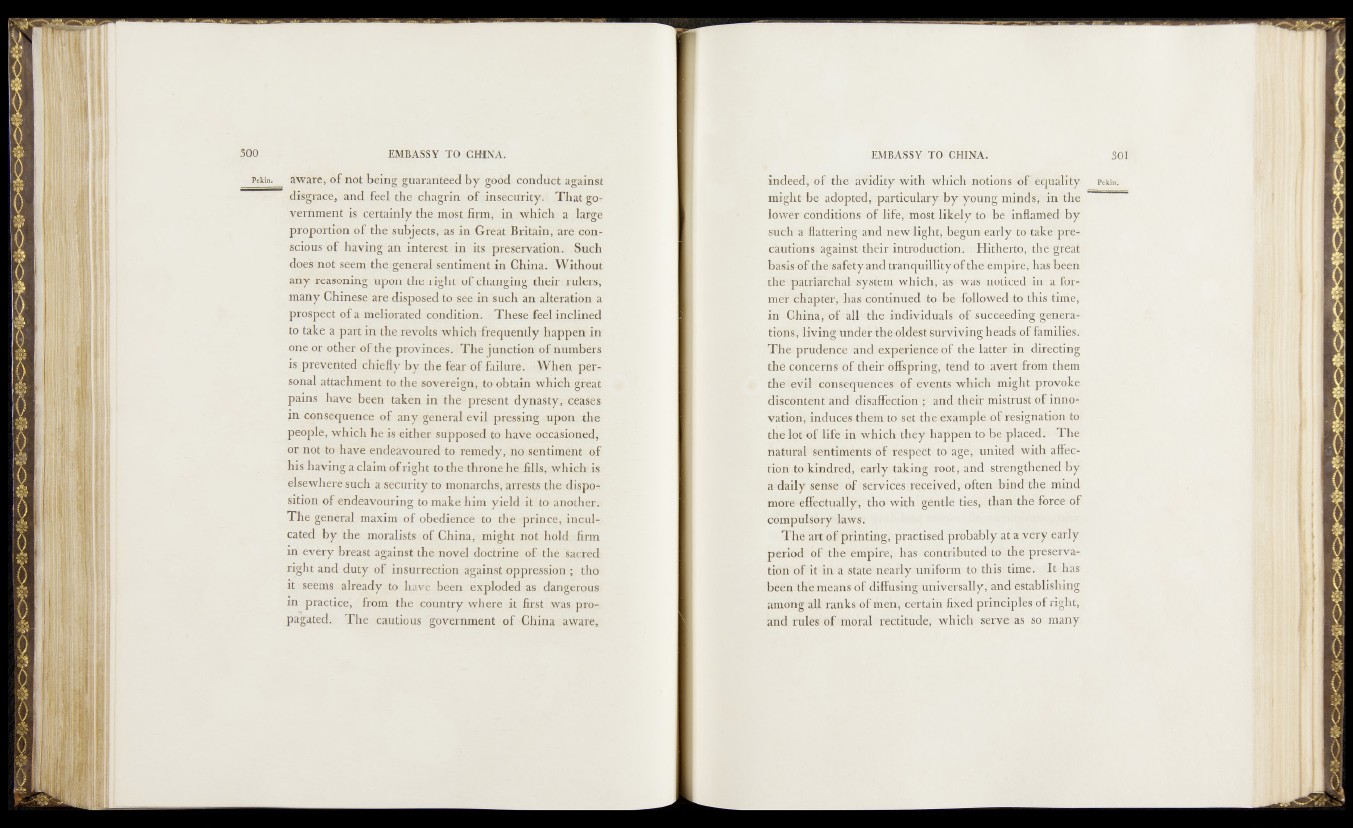
Pekin, aware, of not being guaranteed by good; conduct against
disgrace, and/feel the chagrin of insèeürity.- That go^
vernment is certainly the most.firm, in which: a.large
proportion o f the’subjects, as in Great Britain, are conscious
of having an interest in its preservation. Such
does not seem thejgeneraf sentiment in China. Without
any reasoning upon the o f changing their; rulers,
many Chinese'are disposed to see in such an alteration a
prospect of a meliorated condition. These feel inclined
to take a part in the revolts which frequently happen in
one or other oftthe provincés. The junction: of numbers
is prevented chiefly by the fear óf failure. When personal
attachment to the sovereign«,.'to obtain which great
pains have been taken in the-present dynasty,* jjeaaes
in Consequence of any general evil pressing. <upon?:the
people, which he is either supposed to have occasioned,
or not to have endeavoured to remedy, no sentiment' of
his having a claim of right to the throne he fills, whichis
elsewhere such a security to monarchs, arrests the dispos
sition of-endeavouring to make him yield itltéfanother.
The general maxim of obedience to -thè prince* inculcated
by the moralists of China, might not hold firm
in every breast against thé novel doctrine o f thé sacréd
right and duty of insurrection against oppression ; tho
it seems already to have been exploded as dangerous
in practice, from: the country where it first was propagated.
The cautious government of China aware,
indeed, o f5 The a rid ity -with which notions of"equality Pekin,
mights bq ad bp ted ,i i par t icu lar y / b y qyo u n g: minds* in th e
loW^'cbnditionS5%fdife,rihost litóely towfee^nflamedby
süteh a flattcrin^and’riew lighti, beguntearlyftotake precaution
s^against thëir ûntrôdUctièhïi Hithert%$tftÉö gréât
basis of the-safety and tranquillity of the»^mpirC phas1 been
theopatriarehalïtsy^em which, as*/was- notice chin a for-
mefc cfeapt'er, has; continued to^ecis^tes^ed^tq^this tiniey
in China, of*all the individuals’'Ofhsu®«eeding«genera-'
tio n s '^ ^ iu g a n d e r theoldest survivingdioads ©f families;
Theprudenc'e faTid'experïence of the“latter«fcf^Sefei|ing
thé concerns' of- their offspring*,» ténd to ayeri'feom them
the Netful** cônSëqUénëesfr- o f ’events which migMt. provoke
discontent and disaffection ; and'theiï .mistrtrstiqi innoi
vation, inducessthihlTd'set theMxainp/le«o^resigMtaQnife@j
the lo to f lif e in which îlhëy^happêri to'bê plaGed.i T h e
natural*'sentiments1 o f re^pecUtoî^l^unit'ôd with* affeG?
fion to kindred, early taking.root, and- strengthened b}?
â d aily sense df services recefvëdyoften bind the mind
mdre effectually, ého; with .gentle Tieèg than thdlfcree o f
Compulsory laWS.
T h e *irt o f printing, practised probably at*a y e ry e a rly
period of the!>fempire; has- Contributed to the/preserva^
tion of it in a state*nearly uniform to* thisl/time. I t has
béen lhéiöeans oft'diffiusiiigtoiiversally; andfest-ablishiiag
among all ran k sn f men, Certain-fixed principles ofinigh^
and rules of moral rectitude,‘which servê^às so many